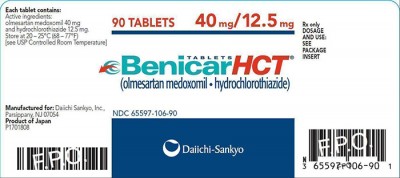Lawsuits against Benicar manufacturer Daiichi-Sankyo will finally go to trial late next year, according to a U.S. District judge in New Jersey. The first trials are scheduled to begin in the fall of 2016.
Currently, the number of lawsuits over the blood pressure medication exceeds 1,100. However, those in the legal community who have been working on the cases expect to number of cases to triple in coming months. Eventually, there may be as many as 4,000 claims against Daiichi-Sankyo over its flagship product. Benicar has been implicated in serious gastrointestinal injuries. Symptoms include chronic diarrhea, dramatic weight loss, and malnutrition. In simple terms, patients literally starve – in some cases, to death.
Benicar (olmesartan) is one of several prescription drugs currently on the market that are classified as “angiotensin II receptor blockers” (ARB). Angiotensin II is a naturally occurring protein, produced by the liver, that regulates the cardiovascular system and controls blood pressure. When this protein is released into the system, it causes the blood vessels to constrict and increases sodium levels. This has the effect of raising blood pressure, forcing the heart muscle to work harder in order to pump blood. Benicar prevents the release of angiotensin II, allowing the blood vessels to dilate, allowing for easier blood flow.
The most serious side effect of Benicar is a condition known as sprue-like enteropathy. The symptoms mimic those of another serious, but treatable disorder called celiac disease, an auto-immune condition affecting the small intestine. Because it has been mistaken for celiac disease, the sprue-like enteropathy caused by Benicar was often misdiagnosed, causing patients needless suffering for years. In some cases, death has been the result. Additional side effects include liver damage, kidney failure, arthritis, arrhythmia (irregular heartbeat) and angioedema (sudden swelling of the skin).
By the time the FDA finally acknowledged “clear evidence” of the link between Benicar and gastrointestinal injuries in 2013, the drug had been on the market for 11 years. Despite this, the FDA has stated that the benefits for patients suffering from hypertension outweigh the risks from side effects. Today, physicians still write over 11 million prescriptions for Benicar annually. Olmesartan drugs are among the top 50 pharmaceutical products in terms of global sales, accounting for nearly $3.2 billion in revenues during 2014.
Law firms such as Levin Papantonio who have filed lawsuits against Daiichi-Sankyo allege that Benicar is a dangerous and poorly-designed medication. The complaints also state that the manufacturer failed to issue adequate warnings and that the company engaged in misleading marketing and deceptive advertising.
The cases against Daiichi Sankyo will be heard by the Honorable Judge Joel Schneider of the U.S. District Court for the District of New Jersey in Camden. At the end of September, Judge Schneider ordered a review of documents involving a $39 million settlement over allegations that the company violated the False Claims Act in paying kickbacks to physicians for prescribing its products.
There is a monumental amount of work that must be done before trials can begin. A large part of this is because Benicar has been on the market since 2002. Lawyers on both sides of the case are currently devising procedures by which they will review as many as 40 million pages of case-related documents that will be entered into the discovery process (during which all evidence is on the table for examination by all parties). They will also be selecting specific cases for “bellwether trials,” which will set precedents for additional cases going forward.

